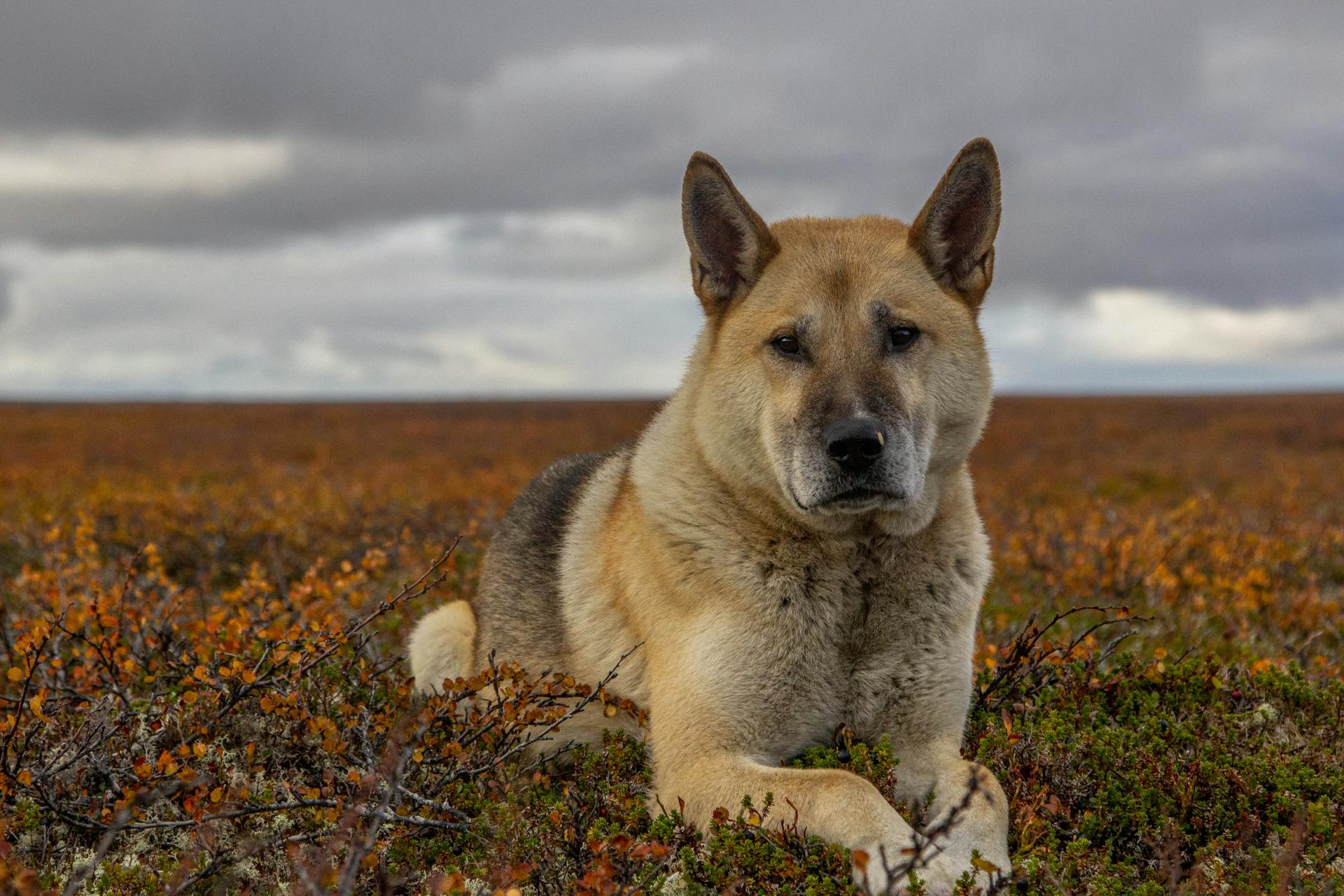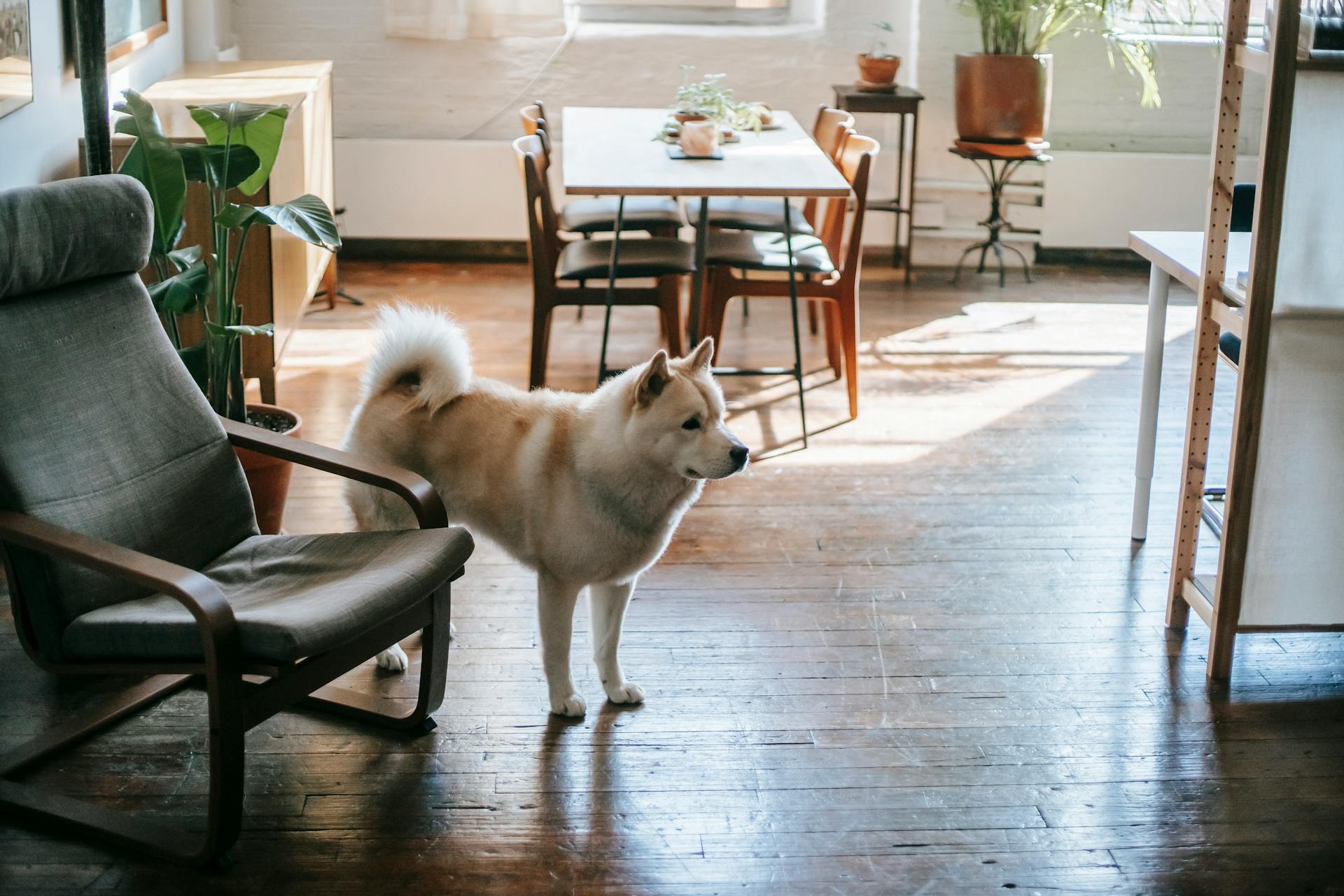
Akitas can make wonderful family pets, but it's essential to consider their nature and needs. Akitas are a powerful breed, with males weighing up to 130 pounds and standing 28 inches tall.
Their large size can be intimidating, but it's not necessarily a reason for concern. With proper training and socialization, Akitas can be gentle and loving companions.
However, Akitas do have a strong prey drive and may not be suitable for homes with small pets. This is a crucial consideration for families with other animals.
Akitas are also known for their loyalty and protective instincts, which can be beneficial for families with children. However, this loyalty can sometimes manifest as aggression towards strangers or other animals.
Here's an interesting read: Pit Bulls Are Not Dangerous
Are Akitas Dangerous?
Akitas are considered dangerous dogs due to their physical characteristics and history. They can weigh up to 130 pounds and reach a height of 28 inches, with a powerful bite like Pitbulls.
Their hunting and fighting history is also a concern. Akitas originated in Japan and were bred for hunting animals like wild boar, elk, and brown bears.
Worth a look: American Akita History
Proper socialization is key to preventing undesirable behaviors in Akitas. A well-socialized Akita is a well-behaved dog, but a poorly socialized one may overreact and show fear or aggression.
If you're considering bringing an Akita into your family, it's essential to research their breed information and be willing to spend time training and socializing them. Akitas were bred to hunt, so they may chase and seize cats.
Here are some key factors to consider when deciding if an Akita is a good fit for your family:
- Weight: up to 130 pounds
- Height: up to 28 inches
- Hunting and fighting history
- Need for proper socialization
- Potential to chase and seize cats
Temperament and Behaviour
Akitas are naturally confident, territorially protective, and bold, making them excellent guard dogs. They have a strong protective instinct, which can lead to aggressive behavior if provoked, especially when it involves their home, food, or family.
Their bold mindset and strong mentality can sometimes make them appear intimidating, but they are also known for their loyalty and dedication to their owners and family. In fact, Akitas are often described as "gentle giants" with children.
Akitas can be cautious and reserved, but they can also be overwhelming without realizing it, which can create enemies for life. They are possessive of food and toys and don't like being teased or having their personal space invaded.
Their behavior can be complex, and it's essential to understand how they interact with each other, especially if you have multiple Akitas in the household. In male-female combinations, the male will often take the lead and dominate the relationship, leading to power struggles.
Akitas are not recommended for first-time owners or timid people, as they require experienced owners who can supervise interactions between dogs and children. They also need to be socialized and trained properly to minimize uncomfortable situations.
Here are some common types of aggression in dogs, including Akitas:
- Dominance Aggression: triggered when something is taken from the dog or the family member pets, holds, picks up, or disturbs the dog when it's sleeping.
- Defensive Aggression: occurs when the dog is afraid and approached too quickly.
- Territorial Aggression: directed at strangers that approach the home or yard.
- Predatory Aggression: directed at small and quick-moving animals and children.
- Pain Elicited Aggression: directed at anyone that approaches the dog while it's in pain or injured.
- Punishment Elicited Aggression: directed at anyone who yells or hits the dog.
- Redirected Aggression: directed at any person that approaches the dog when it's in an aggressive state.
It's essential to recognize the signs of aggression in Akitas and take steps to prevent it, such as providing adequate exercise, training, and socialization. With proper care and attention, Akitas can make wonderful and loving companions.
Family Dog Suitability
An Akita can be a great family dog, but only for certain types of families. They're ideal for families with older children who can understand and play with them respectfully.
Adults need to supervise every interaction between Akitas and kids, as they take social status seriously and don't tolerate mistreatment or invading their personal space.
Akitas are not recommended for first-time owners or timid people, as they require a lot of care and attention.
If you're considering getting an Akita, be aware that they have high levels of energy and need consistent exercise, which may not be suitable for apartment lifestyles.
Here are some key points to consider:
- High levels of energy and the need for consistent exercise
- Not for apartment lifestyles
- Very loyal and affectionate towards family/loved ones
- High levels of shedding/grooming maintenance
Dog Bite Medical Attention
If you've been bitten by an Akita, it's crucial to seek medical attention right away. This is because dog bites can have serious side effects and symptoms, and ignoring them can lead to more harm.
Make sure your environment is safe to call for help before doing anything else. This means not putting yourself or others at risk.
Give your doctor as much information as possible about the attack, including any details you can remember. Be honest and don't downplay anything – it's better to be thorough than to leave out important information.
Listen to your doctor's advice and treat any wounds as directed. This is crucial for preventing infection and promoting healing.
Document everything about your treatment, including any medications you're taking and any follow-up appointments you have. This will help you keep track of your progress and make sure you don't miss any important steps.
Follow up with a skilled dog bite lawyer to explore your options and get the help you need.
My Experience
My Akita, Bakudai, was a strongheaded puppy from the start, already showing signs of assertiveness even as a young dog.
Bakudai snapped at a friendly Akita adult dog with no provocation, simply because he felt challenged by the presence of another dog.
Socialization makes all the difference - I noticed Bakudai respects dogs that show their respect first, as evidenced by his good behavior with a properly socialized Rottweiler.
Bakudai's aggressive behavior was also triggered by a traumatic experience, as he was attacked by a rogue Rottweiler when he was just a few months old.
The attack left Bakudai with a killer instinct, causing him to see red whenever he encountered a Rottweiler or smelled their scent.
Fortunately, Bakudai was able to overcome this trauma with proper training and socialization, including training with his owner and me, Aimi.
Recommended read: Akita Inu Training
Female
Female Akitas can be just as aggressive as their male counterparts.
Aimi, a female Akita, showed similar aggression as a puppy to a German Shepherd, snapping at him without warning.
Female Akitas may not be as cuddly and playful as their well-behaved counterparts, but they can be just as loving and affectionate when they feel safe and comfortable.
Aimi bit a friend of mine on the leg, which took a month to heal, when she encountered another dog on a leash that started snapping at us.
Female Akitas can be a handful, but with proper socialization and training, they can be turned into a neighborhood mascot.
Through group activities and friendly interactions with strangers from an early age, female Akitas can learn to be calm and well-behaved.
Readers also liked: Female Japanese Akita
Frequently Asked Questions
Why is the Japanese Akita banned?
The Japanese Akita is not necessarily "banned", but it's often considered a high-risk breed due to its large size and strength, which can lead to serious injuries if it bites or attacks. This is why some communities and insurance companies may have specific regulations or restrictions for owning an Akita.
Why is my Akita so aggressive?
Your Akita's aggression may be due to issues with pack hierarchy and sociability, often directed at children and strangers. Learn more about addressing these underlying causes to help your Akita feel more comfortable and calm
How many Akita attacks per year?
According to available data, there are approximately 40 Akita dog bites reported per year over the last 50 years. This relatively high number is surprising given the Akita's rare breed status.
Sources
- https://theakitalife.com/are-akitas-dangerous/
- https://dogsbestlife.com/dog-breeds/japanese-akita/
- https://www.noonanlawma.com/brockton-dog-bite-lawyer/dog-bites-and-attacks-american-akita-and-japanese-akita/
- https://www.bestattorney.com/dog-bites/akita-dog-breed.html
- https://theakitainu.com/akita-temperament-expected-behaviour/
Featured Images: pexels.com


